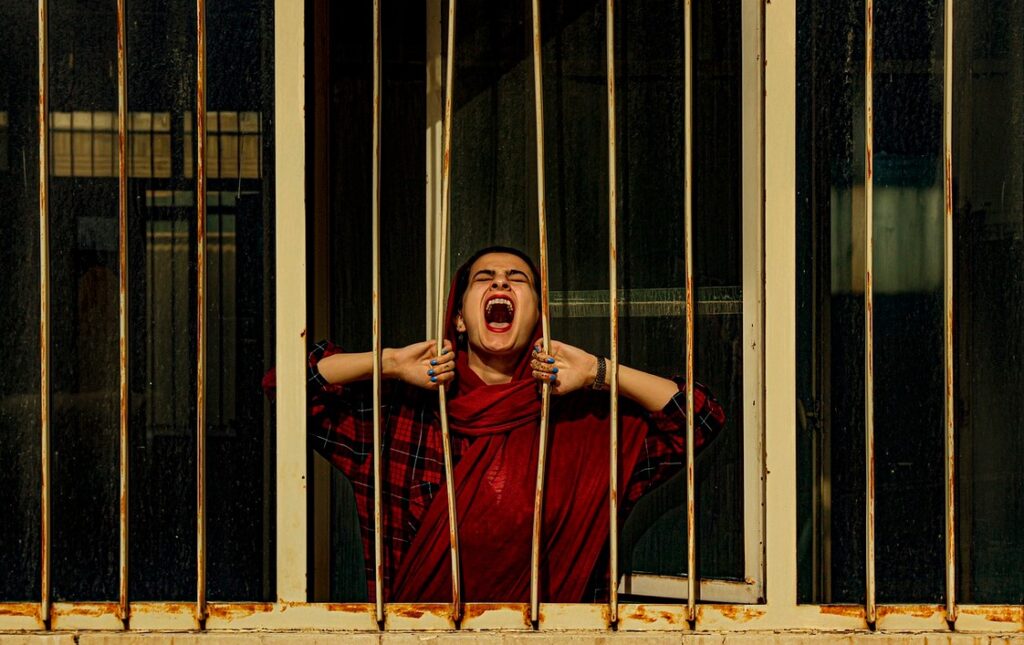Iran’s morality police are once again under fire, this time over the beating of a young 16-year-old girl. According to the Norway-based Kurdish rights group Hengaw Organization for Human Rights, a teenage girl in Iran is in a coma after being assaulted by the morality police in Tehran’s subway. Armita Garawand was allegedly attacked for violating the Islamic republic’s hijab rules and not wearing a headscarf properly. Iranian authorities deny the claims.
Garawand’s situation is similar to the case of Mahsa Amini who was murdered in September 2022. She died in the hospital under suspicious circumstances, having been beaten by authorities for allegedly not wearing her hijab properly.
Amini’s arrest led to mass protests that represented the largest challenge to the Iranian regime since the 1979 revolution. Since the large-scale protests subsided, many women in Tehran can be seen without the hijab in defiance of the law.
But this comes at tremendous risk.
Iranian authorities have launched a renewed push in recent months to crack down on women defying the Islamic Republic’s strict dress rules for women, including the mandatory hijab.
The New York-based Center for Human Rights in Iran (CHRI) said women and girls “face increased violence, arbitrary arrests and heightened discrimination after the Islamic Republic re-activated its forced-veiling police patrols.”
Hengaw said Geravand was assaulted by morality police and has been in a coma since Sunday. Another opposition network, IranWire, said it had obtained information that Geravand was admitted to the hospital with “head trauma,” according to a CNN report.
In a video posted on state-affiliated Fars News Agency’s account on X, formerly known as Twitter, a group of girls are seen entering the metro train. It is unclear which girl in the video was Geravand.
Some of the girls entering with Geravand appeared to not be wearing headscarves. Moments later, the video shows a group of girls carrying Geravand out of the metro train, placing her on the metro platform.
No altercation can be seen on the edited video posted on state media.
Hengaw said that Garawand was left with severe injuries after being apprehended and physically attacked by agents of the so-called morality police at the Shohada metro station in Tehran on Sunday.
It said she was being treated under tight security at Tehran’s Fajr hospital and “there are currently no visits allowed for the victim, not even from her family.”
The organisation later published a picture it said was of Garawand in her hospital bed, showing her head and neck heavily bandaged and attached to a feeding tube. “Her state of consciousness is unchanged,” it added.
Her parents gave an interview to Iranian state media at the hospital but “in the presence of high-ranking security officers” and “under considerable pressure,” Hengaw said.
Geravand’s mother and father said in the interview that their daughter seemed to hit her head after fainting from low blood pressure while she was on her way to school. The parents said there were no signs from the videos they saw that Geravand was assaulted.
“I think they said she had low blood pressure… drop in blood pressure or fallen on the floor… her head hit the edge of the metro and then (her friends) took her off (the train),” her mother Shahin Ahmadi said.
It is unclear if Geravand’s family were coerced into speaking to state media. In the past, UN human rights officials and rights groups have accused Iranian authorities of pressuring families of protesters killed to make statements supportive of the government narrative.
Reports have emerged that her mother has now been arrested, deepening suspicions that the state is attempting to cover up the truth.
The bigger question of course is why Iran’s women and girls are still being subjected to such cruel and harsh punishment in addition to constant discrimination and harassment.
The UN Committee on the Elimination of Discrimination against Women and the Special Rapporteur on violence against women and girls can and should do more.
Afghanistan’s women also suffer from extreme violence and persecution.
According to Just Security, “Since its takeover of Afghanistan in August 2021, the Taliban has issued nearly 100 edicts and decrees severely restricting the daily lives of women and girls, removing them from public life – from Parliament, offices, salons, universities and schools, parks and playgrounds, and protests – and relegating them solely to child-bearers, child-rearers, and sources of unremunerated domestic labor.”
Since the beginning of Turkey’s AKP-Erdogan government, extra-judicial killings targeting activists of the Kurdish Women’s Freedom Movement inside and outside the borders of Turkey have multiplied.
On Tuesday, at the Third Committee of the General Assembly’s 78th meeting, Reem Alsalem, the UN Special Rapporteur on violence against women and girls, shone a spotlight on the persistence of gender-discriminatory nationality laws.
The representative of the United Arab Emirates, speaking on behalf of a group of countries, sounded the alarm over “gender persecution” in Afghanistan, where women are being stripped of their livelihoods and future.
Armenia’s delegate recalled that, on 19 September, Azerbaijan launched an attack against the civilian population of Nagorno-Karabakh which resulted in the death of many civilians, including women and children.
Ethiopia’s delegate, speaking on behalf of the African Group, spotlighted challenges faced by women and girls in rural areas and in statelessness situations, including income disparities, high unemployment and a high incidence of poverty.
What is clear is that women around the world suffer from significant violations and the international community must do more to demand their freedom and rights and hold governments accountable – starting with Iran.
Image: Pixabay
Become a Patron!
Or support us at SubscribeStar
Donate cryptocurrency HERE
Subscribe to Activist Post for truth, peace, and freedom news. Follow us on SoMee, Telegram, HIVE, Flote, Minds, MeWe, Twitter, Gab, and What Really Happened.
Provide, Protect and Profit from what’s coming! Get a free issue of Counter Markets today.


Be the first to comment on "When Will Young Girls be Safe from Iran’s Morality Police?"